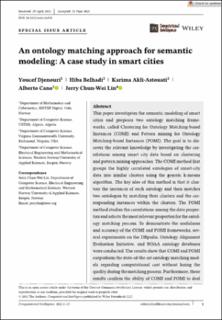| dc.contributor.author | Djenouri, Youcef | |
| dc.contributor.author | Belhadi, Hiba | |
| dc.contributor.author | Akli-Astouati, Karima | |
| dc.contributor.author | Cano, Alberto | |
| dc.contributor.author | Lin, Jerry Chun-Wei | |
| dc.date.accessioned | 2022-08-26T14:03:00Z | |
| dc.date.available | 2022-08-26T14:03:00Z | |
| dc.date.created | 2021-08-25T08:55:43Z | |
| dc.date.issued | 2021 | |
| dc.identifier.citation | Computational intelligence. 2021, 38 (3), 876-902. | en_US |
| dc.identifier.issn | 0824-7935 | |
| dc.identifier.uri | https://hdl.handle.net/11250/3013825 | |
| dc.description.abstract | This paper investigates the semantic modeling of smart cities and proposes two ontology matching frameworks, called Clustering for Ontology Matching-based Instances (COMI) and Pattern mining for Ontology Matching-based Instances (POMI). The goal is to discover the relevant knowledge by investigating the correlations among smart city data based on clustering and pattern mining approaches. The COMI method first groups the highly correlated ontologies of smart-city data into similar clusters using the generic k-means algorithm. The key idea of this method is that it clusters the instances of each ontology and then matches two ontologies by matching their clusters and the corresponding instances within the clusters. The POMI method studies the correlations among the data properties and selects the most relevant properties for the ontology matching process. To demonstrate the usefulness and accuracy of the COMI and POMI frameworks, several experiments on the DBpedia, Ontology Alignment Evaluation Initiative, and NOAA ontology databases were conducted. The results show that COMI and POMI outperform the state-of-the-art ontology matching models regarding computational cost without losing the quality during the matching process. Furthermore, these results confirm the ability of COMI and POMI to deal with heterogeneous large-scale data in smart-city environments. | en_US |
| dc.language.iso | eng | en_US |
| dc.publisher | Wiley | en_US |
| dc.rights | Navngivelse 4.0 Internasjonal | * |
| dc.rights.uri | http://creativecommons.org/licenses/by/4.0/deed.no | * |
| dc.subject | Clustering | en_US |
| dc.subject | Ontology matching | en_US |
| dc.subject | Pattern mining | en_US |
| dc.subject | Semantic modeling | en_US |
| dc.subject | Smart city | en_US |
| dc.title | An ontology matching approach for semantic modeling: A case study in smart cities | en_US |
| dc.type | Peer reviewed | en_US |
| dc.type | Journal article | en_US |
| dc.description.version | publishedVersion | en_US |
| dc.rights.holder | © 2021 The Authors | en_US |
| dc.source.pagenumber | 876-902 | en_US |
| dc.source.volume | 38 | en_US |
| dc.source.journal | Computational intelligence | en_US |
| dc.source.issue | 3 | en_US |
| dc.identifier.doi | 10.1111/coin.12474 | |
| dc.identifier.cristin | 1928541 | |
| cristin.ispublished | true | |
| cristin.fulltext | original | |
| cristin.qualitycode | 1 | |

